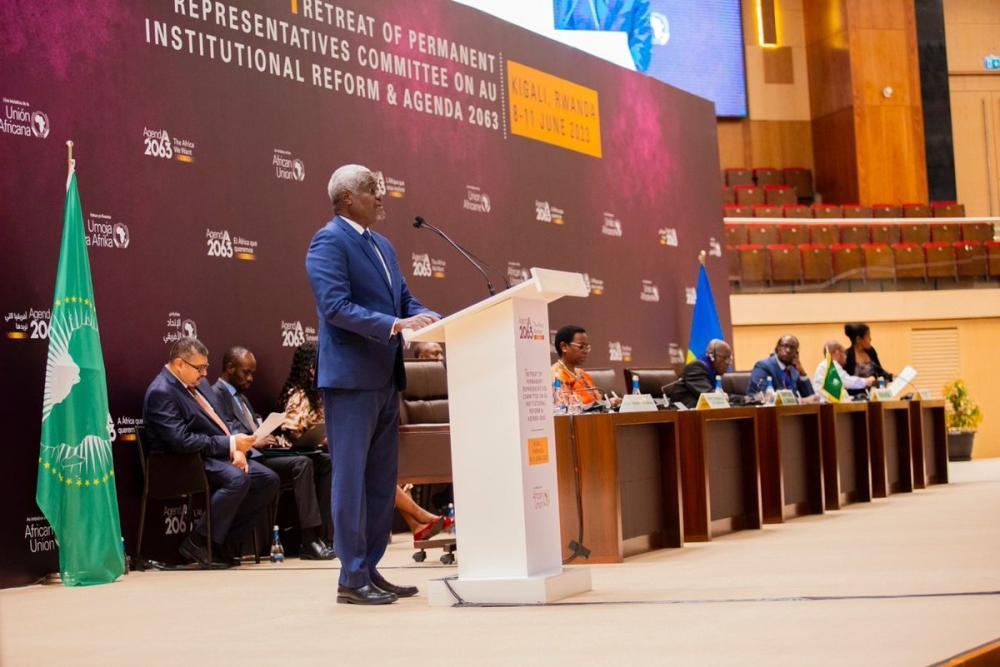Dr. Charles Kiiza
Africa-Press – South-Africa. At the recently concluded International Security Conference on Africa in Kigali, a truth was spoken that should echo across every African capital, every cabinet room, every school, and every home.
Former African Union Commission Chairperson Moussa Faki Mahamat laid bare a painful fact: had the three African representatives at the United Nations Security Council stood united in 2011, they could have blocked the NATO-led intervention in Libya, an intervention whose scars are still visible today.
That single moment of African disunity reshaped a nation — and left the rest of the continent grappling with the consequences.
In my view, the greatest challenge Africa faces today is not poverty, not conflict, not even foreign interference — it is disunity of purpose.
Again and again, Africa has shown that divided we fall, while others decide our fate. If Africa truly wants to break through the chains of marginalisation and claim its rightful place on the world stage, we must stop looking only to summits and declarations.
We must start by reshaping the minds of the next generation through a value-based education system rooted in unity, African identity, and moral purpose.
Here is where African leaders must focus if they wish to chart a course toward self-determined development:
Forging unity through language
The 2002 AU Summit in Durban wisely adopted Swahili as a Pan-African language. But where is the progress? Language is more than words; it is connection. A shared African language will break down the colonial-era barriers of French, English, Arabic, Portuguese, and Spanish, allowing us to communicate as one people.
It will enable a Namibian to speak easily with a Nigerian, a Senegalese with a Tanzanian. African leaders must act now to introduce Swahili in schools and public institutions, forging the linguistic unity that lays the groundwork for political and cultural solidarity.
Inculcating core values early
We must not underestimate the power of early education in shaping the character of future leaders and citizens. Schools must become the incubators of love for country and continent, selflessness, honesty, integrity, and hard work.
These values, when woven into the educational fabric, will nurture generations who will not easily sell out their countries’ interests, who will resist corruption, and who will serve with the continent’s good in mind.
Promoting African Unity and ubuntu
The African philosophy of Ubuntu — “I am because we are” — must be more than just a slogan in political speeches. It must become part of the lived experience of every African child.
Schools should deliberately teach the histories, cultures, and struggles of the entire continent, so a child from Namibia grows up seeing an Egyptian, a Congolese, or a Somali as kin. A Pan-African consciousness is not natural; it must be deliberately cultivated.
Building an African identity
Too often, African children grow up knowing more about European or American icons than about African heroes. We need to reverse this trend. From the first day of school to the final day of secondary education, African learners must be steeped in African history, values, languages, and achievements.
You cannot defend or sacrifice for what you do not love. You cannot love what you do not know.
The road ahead
If African leaders embrace this educational vision, they will lay the groundwork for an Africa that can stand united — an Africa that can confidently negotiate in international forums, push back against exploitative arrangements, and chart its own development path.
The events around Libya’s collapse teach us that geopolitical strength starts with internal unity. And unity is not something you decree from above; it is something you nurture from below, in classrooms, homes, and communities.
The stakes are high. If Africa fails to unite, we will continue to be the playground for external powers, our future shaped by decisions made in distant capitals.
But if we build unity through a value-based, Pan-African education, we can ensure that the next generation of African leaders will sit at the global table not as beggars, not as divided voices, but as a united, proud, and determined force shaping their own destiny.
Africa’s time has come, but only if we rise together.
The author is a University Don teaching Diplomacy and International Relations at the University of Rwanda.
Source: The New Times
For More News And Analysis About South-Africa Follow Africa-Press






